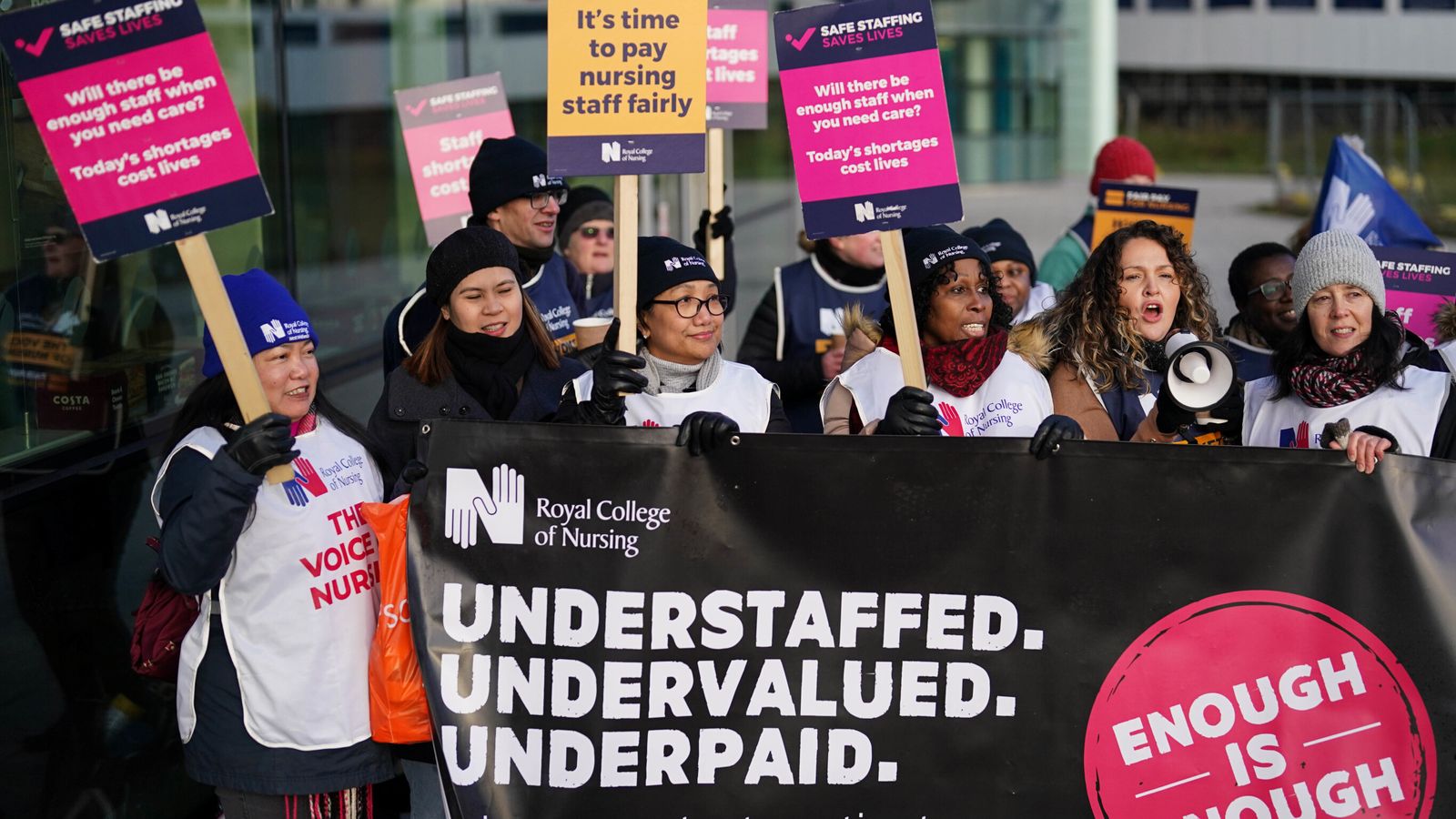Ambulance and other health workers in Unison will strike on 8 March in an escalation of the long-running dispute over pay, the union announced.
The organisation said the industrial action is a “direct result of the government’s failure to hold proper pay talks”.
It comes after the Royal College of Nursing (RCN) agreed to pause strike action as it is “confident” of agreeing to a pay deal during “intensive talks” with ministers.
Politics live: Two top ministers show signs of tension as Rishi Sunak faces Brexit questions
Unison general secretary Christina McAnea accused Downing Street of a “pick-and-mix” solution by agreeing to discuss wages with the RCN but not other unions.
She said: “Unfortunately for patients, staff and anyone that cares about the NHS, the strikes go on.
“There can be no pick-and-mix solution. NHS workers in five unions are involved in strike action over pay, staffing and patient care.
In first breakthrough of long-running dispute, nurses to begin ‘intensive talks’ with govt today
Anti-strikes bill branded ‘shoddy and unworkable’ after ‘damning’ watchdog assessment
There’s good news for the UK economy – but not necessarily for the chancellor
“Choosing to speak to one union and not others won’t stop the strikes and could make a bad situation much worse.”
The Unison strikes will involve staff in all but one of the ambulance services in England as well as nurses, blood collectors, porters and cleaners.
Ms McAnea said “the entire NHS team is absolutely determined to stand firm for better patient care”.
She added: “Governments elsewhere in the UK know how pay deals can be done. Rishi Sunak must copy their example, hold proper pay talks and allow everyone to get back to work.”
In Scotland and Wales, NHS strike action has been paused following revised pay offers from the government.
On Monday night, there was a breakthrough in England as the RCN called off a planned 48-hour walk-out next week.
The union said it will meet with the health secretary on Wednesday to begin “intensive” negotiations and it “will pause strike action during these talks”.
Please use Chrome browser for a more accessible video player
However, this sparked anger from other unions, who accused the government of “divide and rule” tactics by only agreeing to talk with the RCN.
Wave of strikes continue
The announcement from Unison comes as the wave of strikes which has swept the country since last year is set to continue.
The National Education Union has reiterated its stance that it will not call off strikes – unless the government is prepared to discuss “substantive” matters.
Earlier, Aslef announced that drivers on London Underground will walk out on the day of the spring budget in a row over pensions and working arrangements.
They will join around 100,000 civil servants who are also set to walk out over pay and conditions on 15 March.
Aslef said the dispute is over a failure of Transport for London (TfL) to accept that changes to working arrangements and pensions should happen by agreement.
Finn Brennan, Aslef’s full-time organiser on the underground, said: “Our members are not prepared to put up any longer with the threats to their working conditions and pensions.
“We understand that Transport for London faces financial challenges, post-pandemic, but our members are simply not prepared to pay the price for the government’s failure to properly fund London’s public transport system.”
Rail negotiations ‘in hiatus’
Meanwhile, Network Rail said negotiations with the RMT over a separate dispute are in “hiatus” after the latest offer was rejected without a vote.
Chief executive Andrew Haines said the government-owned company is “not refusing to talk” to the union but there is “a difference between talks and meaningful negotiations”.
Fresh strikes beginning on March 16 were announced last week.
Mr Haines said the RMT has rejected “the fundamental principles” of the negotiations, including that pay rises must be linked to modernisation leading to productivity improvements.
He went on: “We are having to take stock because three consecutive times we’ve reached what we’ve believed is an in-principle deal with the negotiators, only for it to be rejected three times by the executive committee of the RMT.
“So you have to say why do we keep following that process? We’re in a hiatus while we consider the appropriate next steps.”











